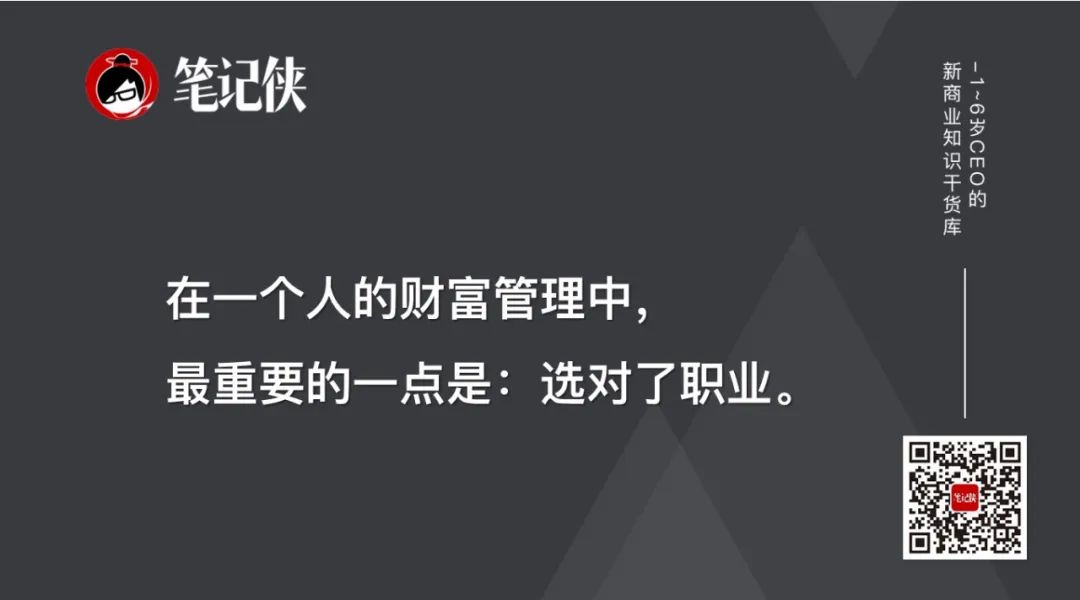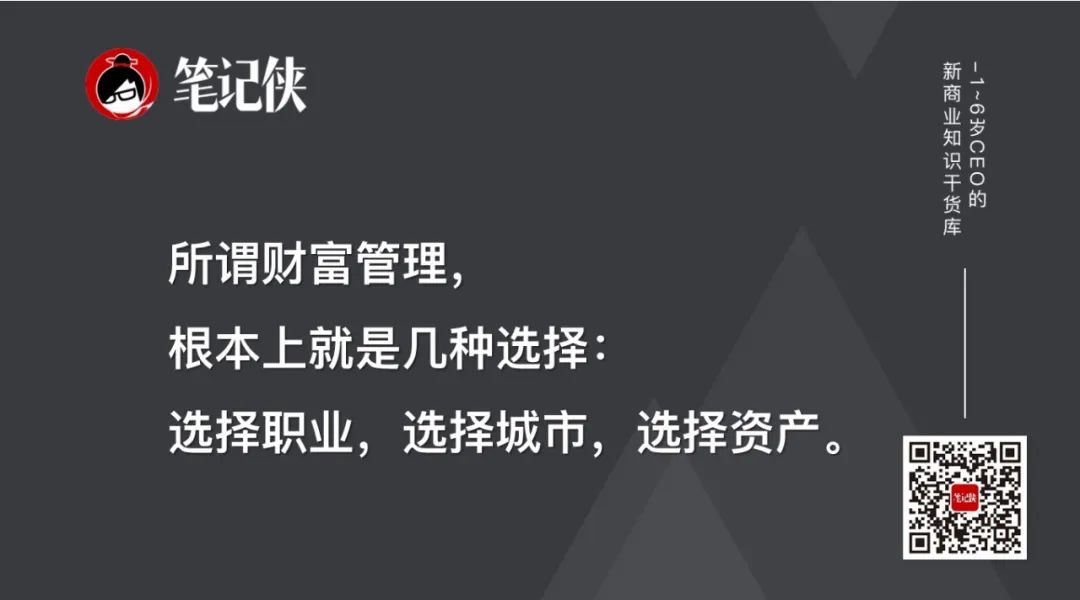There is no problem of managing money bags sooner or later.
Editor’s note: This article is from the WeChat public account “Noteman” (ID: Notesman) , the author floats .
Interviewee profile:
Xiang Shuai, a well-known financial scholar, the founder of Xiangshuai Digital Financial Studio, the founder of the public account of “Xiangshuai’s financial rivers and lakes”, and author of the best-selling books “Where the Money Comes: Chinese Family’s Wealth Plan” Never Sleep: The Undercurrent of the Capital World.
I. Everyone must have their own wealth management
Q: What is wealth management? What kind of people can do wealth management with salary and age requirements?
Answer: This question is quite fun. Does wealth management require salary or age? I give the answer directly, no. The sooner wealth management is better, and the poorer the people, the more wealth management is required.
1. Wealth management
In fact, everyone has always misunderstood the word “wealth”. Many fortune courses and wealth masters on the market like to talk about “money for money” chicken soup. For example, a person who wants to get rich depends on his income after bed, that is, a financial asset that can be profitable when lying down. So many people think that freedom of wealth depends on investment, stock speculation, stock speculation, and so on. I think this is a particularly unreliable idea.
Realistic data tells us that until 2019, the main source of wealth for ordinary people around the world is still labor income.
For example, 74.3% of ordinary household income in the United States comes from labor income; even the richest 10% of American households earn about half of their income. For more ordinary people, labor income such as wages accounts for 80% of total income.
So, the most important thing in a person’s wealth management is that you have chosen the right career.
For example, the hottest occupation in the 1980s was the worker. Have you seen Yu Hua’s novel? At that time, the workers’ income was still high and drought and floods ensured their income. I don’t know how many people envy. By the 1990s, workers might face laid-offs. At this time, you will enter different companies and have different wealth trajectories. For example, if you followed Ma Yungan at the end of 1998, you must now be free of wealth.
So, career choice is the most important step in a person’s wealth accumulation.
We have a very popular saying, “Wealth comes from labor creation”, but it actually makes sense.

Choose a career, and a city.
Many people struggle with career choices and asset choices, but they never realize that the choice of a city affects their personal wealth more profoundly.
Because wealth creation has always been closely linked to cities.
We see that in the wealth creation history of most characters, cities are the core factors that determine growth. But few people realize that the same people have different wealth creation abilities in different cities.
For example, in 1992, the annual net income of an ordinary family of three in Beijing’s working class was 7,668 yuan. In the same year, the annual disposable income of a two-employee family in Nanning, Guangxi, was 6,318 yuan, a slight difference between the two.
In 2019, more than 20 years later, the same two-employee family of three will have an annual net income of 203,970 yuan in Beijing and 105,828 yuan in Nanning. This is only liquidity income. If you consider the difference in property prices, the gap will be even greater.
In a sense, the road to wealth for individuals or families is mostly a footnote for our city. I once stated a fact about wealth and cities in our time: the city determines the upper limit of your wealth and the lower limit of your wealth.
Apart from career choices and city choices, where does our wealth gap come from? The common currency speculation and stock trading is just a small piece, called financial asset investment. In fact, the largest piece of assets is real estate, which means that your house determines the relative status of your wealth.
From a global perspective, real estate accounts for a relatively large proportion of the total wealth of residents, about 49%. In many developing countries, the proportion is higher, such as 77% in India and 54% in China.
So the rise and fall of house prices is a microcosm of the fate of a region, and it is also closely related to our wealth.
Which city do you own your house in, which district, and where do you own it, which in turn determines your family wealth. In this regard, everyone has personal experience.
So I have emphasized to you carefully that every property decision you make is a particularly important point in your wealth management.

So, the so-called wealth management is basically several options: choose a career, choose a city, choose assets.
This is the basic logic of wealth management.
2. eachIndividuals need to manage wealth
Seeing this logic, everyone should know that this kind of decision-making on wealth does not start from college graduation, but has already begun at the age of 18. What major the university chooses directly affects our career choices.
So for everyone from 18 to 80 years old, wealth management is very important, there is no problem of sooner or later. As you make different decisions, your life trajectory will be very different.
Everyone can think back to their respective middle school classmates. The majors they choose are different. Are their life trajectories different? And we are not the same as our professional university classmates, but are our lives different?
In a more professional sense, we can decompose wealth into adult capital and capital capital appreciation. The choice of occupation and city is the carrier and soil for the appreciation of human capital. The short-term allocation of real estate and other financial assets is capital capital. Determinants of value addition.
This is what I want to do first to help you get rid of some misunderstandings about wealth management, and then recognize the logic of wealth management.
Q: So, has this epidemic affected real estate?
A: Many people are concerned about the impact of the epidemic on real estate. My answer is yes and no, yes or no.
Let’s talk about this side first.
1. Logic of house prices
To understand the rise and fall of house prices, we must first understand where the value of the house comes from. Is it from brick and tile, reinforced cement, luxurious decoration? of course not.
The official title of real estate is “real estate”, and the price of a house reflects the value of the land on which the house is located.
Purchasing a house in a city is actually an investment in infrastructure in the city in disguise, and the value of the house comes from the economic growth potential of this land, which is everyone’s expectations of how much wealth this land can create in the future.
In this sense, the real estate of a city is the “stock” of the city, which reflects the total future cash flow. Therefore, the long-term value of real estate is determined by the growth level of the country, region and city.
This is the logic of house prices that I want to tell you.
2. Public governance level
Aside from the meeting. In this epidemic, we can clearly feel how important the management level of a city’s schools, hospitals, and communities is, so the level of public governance will affect the future of the house.
After the outbreak, the overall response speed, urban governance, and even cure rates in the Yangtze River Delta region have shown a high level.
So what is the warning to us this outbreak? The level of public governance in a city will affect the future of the city.
In 2020, Chinese people are becoming more expensive, they are more picky about the climate, and they yearn for high-quality education resources. These changes make the location of the house more important: the degree of connection between the house and the business and infrastructure is more important, the appropriate climate is more important, and additional quality education resources are more important.
Originally, we divided cities into first-tier, second-tier, and third-tier. Now I want to modify them and divide them into first-tier and non-first-tier, because with limited resources, the gap between first-tier and non-first-tier cities will widen.
The level of public governance will affect the future of cities. In some areas with better public governance, such as the Yangtze River Delta and the Pearl River Delta, housing prices may be stronger.
So I think: In the long run, the logic of real estate has not changed, and the impact of a city’s level of public governance on house prices will become increasingly prominent.
Of course, all these changes have an impact on wealth.
Second, the wealth outlook of young people
Q: Under the epidemic, with a series of layoffs or pay cuts, what kind of preparations do young people need to make for their wealth accumulation?
Answer: For young people, some of them have been cut in salary and some of them have been increased. Do n’t all game companies raise their pay? Therefore, we must believe that in the short term, such as this two months, everyone’s salary will be affected, but in the long run, it must be balanced. As long as the world is moving forward, wealth must flow to other places.
For young people, without this job, they can go to another job, so what kind of preparations should everyone make?
Everyone needs to make some preparations for wealth decisions.
Remember: post-90s should follow two words in wealth management and wealth decision-making, one is called fast and the other is slow.
The character of the digital age is fast. Changes fast, everything is fast. Now you can’t define a business with a ready-made concept, it will change a lot in a few years. At this time of rapid change, the most popular are those who can adapt to change.
For example, from the perspective of the media industry, in the 1990s, paper media was the most developed, followed by the rise of television media, and the media has risen again in the past two years.
But when we look back, when many people say that “x media is declining”, most of the cattle in the media and streaming media come from traditional media.
Liu Shen Lei Lei was once from Xinhua News Agency; Mi Meng, who has been named, is a journalist; 70 to 80 percent of the public relations elites of companies including Tencent and Ali are from these places in the Southern Zhou Dynasty.
So I think